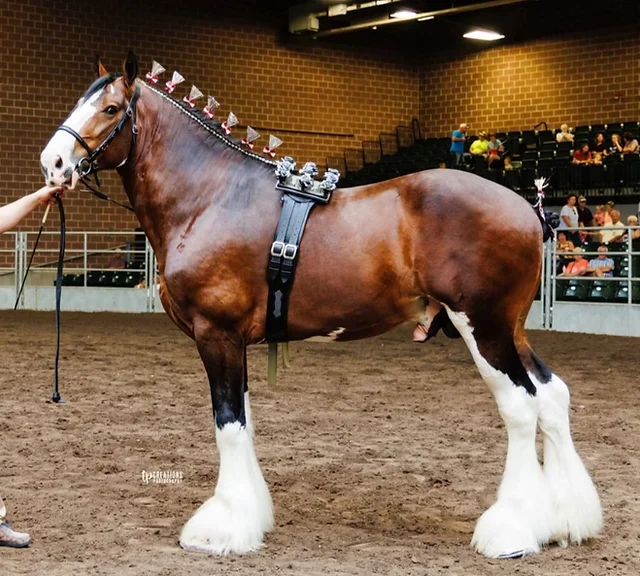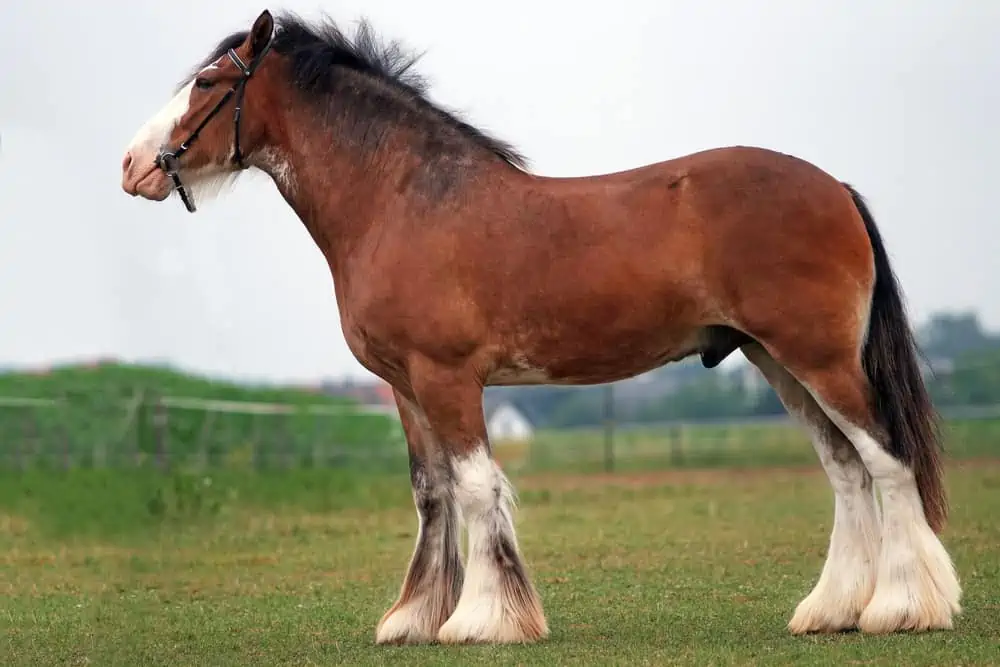
The Clydesdale horses are so well-known in the United States today – thanks in large part to the famous Budweiser Clydesdales. But these horses actually got their name from the River Clyde in Scotland where the breed got its start in the mid-1700s.
While the breed was originally a designated draft (hauling) horse, their unique high-stepping gait has instead made them popular in the show ring.
In this article, learn about the cost of Clydesdale horse as well as one-time and ongoing care and maintenance expenses.
Contents
Clydesdale Horse Purchase Price
The Clydesdale horse is known as the “gentle giant” of the equine world.
Clydesdale Breeders of the U.S.A. states that the cost typically ranges from $1,000 to $5,000+. Award-winning horses can cost into the tens of thousands of dollars; with one amazing horse fetching a jaw-dropping price of $212,500.
EquineNow has Clydesdale horses for sale at prices ranging from $1,000 to $25,000. On the other hand, Warner Clydesdales has a starting price of $3,000 for adult horses and yearlings start at $1,250.
Another option that can offer a more economical price is to rescue a Clydesdale horse in need of a new forever home. Often, adoptable horses are older or have had previous injuries or health issues that may require special care.
Sometimes, however, an owner relinquishes a horse for other reasons; including personal life changes. Adoption fees start at $400 and up.
Factors Affecting Clydesdale Horse Purchase Price
A number of factors can impact the Clydesdale horse purchase price you pay for your new equine companion.
Age – Before shopping for a Clydesdale horse, it is important to know the terminology for different age horses as this can affect the price.
The foal is a newborn horse. Weanling is a foal that has been weaned (is eating on its own). The yearling is a horse less than two years old while filly/colt is a horse less than four years old.
On the other hand, mare/stallion/gelding is an adult horse four years or older. For working or breeding purposes, ages 7 to 14 are considered prime years and will command prime prices.
Colors – Clydesdale horses can display a variety of colors on body and legs. Common body colors and patterns are bay (the most common color), chestnut, brown, black, gray, sorrel, and roan. Legs (“socks”) can be white or black.
Colors typically are not important for competing in shows, but less common colors can fetch higher prices. In contrast, a horse with white face and legs or one with excessive feathering (hair) on the legs may be lower in price.
Bloodline or show awards – If you have a goal to show or breed your Clydesdale, purchasing one from a confirmed champion bloodline makes sense. Consider this – horse semen alone (stud fee) from a champion Clydesdale can bring in anywhere from $750 to as high as $6,500 per order!
Of course, a Clydesdale horse from a champion bloodline is going to be quite a bit more expensive because of future projected income potential from show wins and stud fees.
Gender – In the equine world, you actually have three options when purchasing your Clydesdale horse: an intact female, an intact male or a gelding (neutered male). It is quite unusual for females (mares) to be spayed, although it can happen.
Opinions differ regarding how much gender matters for Clydesdale horse’s temperament and racing potential. Popular opinion favors stallions for racing, although not everyone agrees.
For riding or work purposes, stallions and geldings are typically larger and more powerful and this can impact the horse price (as well as maintenance costs).

One-Time Clydesdale Horse Expenses
These are the most commonly reported one-time or rare recurring costs to care for a new Clydesdale horse.
- Pasture acreage
When available, housing your horse on site can reduce costs for both food and boarding.
If you plan to house your Clydesdale horse on your own property, equine experts say you need to plan to provide at minimum 1.5 to two acres per each adult horse. This amount of pasture can potentially provide adequate daily forage for your horse.
However, some states have statutes regarding minimum acreage per horse (up to 10 acres) for exercise and enrichment. Be sure to check with your state before purchasing the property.
- Horse equipment
Your horse will need to be wearing certain gear before you can begin riding together.
A bridle costs $250 to $75. Headgear costs $15 to $100. The saddle is often the priciest component, costing anywhere from $100 to $1,000.
You will want a saddle pad for your horse’s comfort – a cost of $10 to $50. A girth or cinch for a customized fit costs $20 to $75.
- Rider equipment
Riding your Clydesdale horse can be a lot of fun. But you also need to have the right gear to make sure the experience is safe for you and your horse.
A halter can cost $15 to $25 and a lead costs $10 to $25. Expect to spend $30 to $50 on a helmet for you.
Proper riding boots can cost $100 to $200 while riding gloves typically cost $10 to $20.
- Stable equipment
Having the right stable equipment can ensure your new Clydesdale horse adjusts quickly to life with you and stays healthy and happy.
Be sure to have a first-aid kit on hand at all times for unexpected emergencies. A proper equine first-aid kit costs $100 to $200.
Daily grooming will be important for your Clydesdale’s health and comfort. Grooming supplies typically range in cost from $50 to $100.
Water troughs (30-gallon capacity or greater) cost $50 to $200 per trough depending on size. Manure rakes can cost $15+ per rake.
Wheelbarrows (for transporting manure, hay, grain) can cost $100+. And hoses for water typically run $15 to $30 depending on length.
- Transportation
One frequently overlooked cost of Clydesdale horse ownership is transportation. Whether your goal is to transport your horse to and from favorite riding sites, horse shows, the equine vet or another destination, you will need to have a suitable truck and horse trailer to convey your horse safely.
Your truck will need to have a hauling capacity for a horse that may weigh up to 3,000 pounds and stand up to 10 feet tall. New vehicles with this type of towing capacity can easily cost $50,000+.
The trailer you select must also be sufficiently roomy to accommodate a Clydesdale – one of the five largest equine species in the world! In the best-case scenario, you may be able to find a used horse carrier that costs $10,000+. New custom trailers can cost $100,000+.
Ongoing Cost
These are the most commonly reported ongoing care and maintenance costs to keep a Clydesdale horse.
- Food and water
For an adult horse, breeders report average daily feeds of anywhere from 25 to 50 pounds of hay (one bale) and 2 to 10 pounds of grain/feed per day or about $100 to $120 per month for hay. An adult horse can also consume up to 30 gallons of water daily.
- Supplements
Draft horses have unique nutritional needs. Older Clydesdale horses, in particular, may benefit from regular or daily joint supplements as well as chiropractic care.
One month of glucosamine treatments cost around $40. Other grain supplements can cost around $25 per month.
Nutritional needs change as a horse grows, based on workload, during pregnancy, and seasonally. A 5-pound bag of draft horse mineral and vitamin supplement starts at $27.
Draft horses, because of their huge size, can struggle with developmental bone and joint disorders, especially during youth. Nutritional supplements range from $30 to $150.
- Bedding
Your horse will need plenty of comfortable bedding for in-stall times. Shavings are a popular option you can buy by the bag or the truckload. Costs range from $40 to $100.
- Farrier (hoof and foot) care
American Farriers reports a range of prices for common farrier services. Trimming is $42.06. Trims plus shoe resets averages $113.36. Trimming and re-shoeing cost $120.19.
The average horse needs farrier work every 1.5 to two months.
- Boarding
If you need to go out of town or you can’t keep your Clydesdale horse on your property, boarding is a necessity. Costs vary depending on the facility and what you provide versus what the boarding facility provides.
Costs range from $50 per month to upwards of $500 per month per horse.
- Veterinary and dental care
A nationwide poll of horse owners showed that average dental care costs range from $249 to $500+ annually. Tooth floats cost from $50 to $150. Emergency dental work runs anywhere from $100 to $1,000.
The Coggins test is often required before transporting a horse to a show or somewhere else. The cost ranges from $25 to $50 per test.
Routine veterinary exams (prevention and wellness) cost $25 to $75 and emergency visits cost anywhere from $50 to $100.
Lifesavers Wild Horse Rescue says that annual veterinary costs are typically minor for a healthy horse. Monthly de-worming costs around $13 while vaccinations start at $75 to $150 per shot.
Emergency minor veterinary procedures run $200 to $500.
